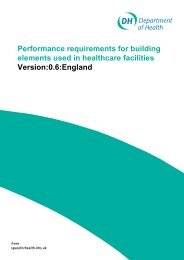Early Life Nutrition and Lifelong Health - Derbyshire Local Medical ...
Early Life Nutrition and Lifelong Health - Derbyshire Local Medical ...
Early Life Nutrition and Lifelong Health - Derbyshire Local Medical ...
Create successful ePaper yourself
Turn your PDF publications into a flip-book with our unique Google optimized e-Paper software.
BMA Board of ScienceChapter 4: Influences on maternal<strong>and</strong> infant nutrition <strong>and</strong>opportunities for interventionInterventions in maternal <strong>and</strong> infant nutrition – a global perspectiveIn May 2004, WHO published a report, Global strategy on diet, physical activity <strong>and</strong> health 239which stated that ‘A life-course perspective is essential for the prevention <strong>and</strong> control of noncommunicablediseases. This approach starts with maternal health <strong>and</strong> prenatal nutrition,pregnancy outcomes, exclusive breastfeeding for six months, <strong>and</strong> child <strong>and</strong> adolescent health.It reaches children at schools, adults at worksites <strong>and</strong> other settings, <strong>and</strong> the elderly <strong>and</strong>encourages a healthy diet <strong>and</strong> regular physical activity from youth into old age’. This was followedby the WHO report Promoting optimal fetal development: report of a technical consultation. 240Its recommendations included initiatives to:• prolong the interval between menarche <strong>and</strong> first pregnancy (> four years)• improve maternal nutrition prior to conception (BMI <strong>and</strong> micronutrient status)• optimise weight gain <strong>and</strong> nutrition during pregnancy• reduce malaria, HIV <strong>and</strong> smoking• promote breastfeeding• develop strategies to avoid gross mismatch between the developmental environment <strong>and</strong>childhood nutritional environment.In March 2006, the World Bank produced a report entitled Repositioning nutrition as central todevelopment, 124 which stated ‘The emphasis of any programmes to combat poor nutrition shouldtarget pregnant women <strong>and</strong> children under two years of age’. This formed part of the WorldBank’s attempt to calculate the cost of a poor start to life. This was based on the savings gainedfrom moving an infant from a low birth weight (2500g) category, underthe headings of:• reduced infant mortality• reduced neonatal care• reduced costs of infant/child illness• productivity gain from reduced stunting• productivity gain from increased ability• reduction in costs of chronic diseases• intergenerational benefits.The total saving was $510 (US) for each low birth weight prevented. This is recognised to be anunder-estimate <strong>and</strong> work is now ongoing to amend it to take into account newer perceptions.Additional factors that may increase the estimate include the fact that the risk of noncommunicabledisease is graded across the normal birth weight range <strong>and</strong> is not just aconsequence of birth weight below 2500g, <strong>and</strong> that disease risk is also associated with highbirthweight. Chronic non-communicable diseases now start earlier in life in many populations <strong>and</strong>the effects can be passed across more than one generation. The ‘discount’ model, which assessesthe relative saving on later poor health by investing in preventative measures, may be too simplefor calculating the real cost-benefit relation. Notwithst<strong>and</strong>ing the need to obtain new estimates ofthe cost, influential economists agree that human development offers a very important time overwhich to intervene to promote later health. 241Interventions designed to improve short-term outcomesMany trials have tested the effect of nutritional supplementation in the mother (usually started inmid-late pregnancy) on birth weight. Few have assessed the effect of pre-conceptionalsupplementation on fetal growth but there are ongoing trials aimed at doing this. In an early trialin the Gambia, a high-energy biscuit for severely undernourished pregnant women increased birthweight by more than 130g, but most trials of energy <strong>and</strong> protein supplementation have shownonly small increases in birth weight (around 50g overall). 8 The same is true of multiple50<strong>Early</strong> life nutrition <strong>and</strong> lifelong health



